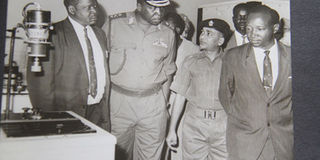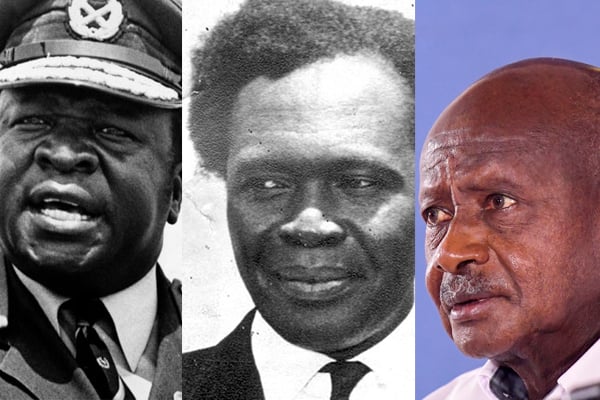Prime
Oboth Ofumbi’s nine days as acting president

L-R: Tito Okello, army commander Idi Amin, an unidentified Indian army officer and secretary ministry of defence Charles Oboth Ofumbi. Ofumbi acted as president from July 9 to 18, 1972, while Amin was away on state visit. COURTESY Photo
What you need to know:
- Stint as president. Uganda is not known to have had acting presidents in its history and that perhaps explains why when we had one for just a week, little is remembered about his short stint in power. He, however, brutally met his death at the hands of the appointing authority. This week we look back at the nine days of Oboth Ofumbi’s reign, through his diary notes, as acting president of Uganda.
As the country geared towards independence, Oboth Ofumbi was one of the lucky few to have been brought into the lower ranks of political leadership when he was appointed assistant District Commissioner for Bukedi in 1960.
Before that, he had been a financial assistant for the same district for two years. A product of Mbarara High and Kings College Budo, Ofumbi’s political career rose so fast when, less than a year after Uganda’s independence, he moved from being a district administrator in Gulu to being the assistant secretary in the Office of the Prime Minister.
From that point on, he never looked back until his death in 1977.
According to one of his sons, Godfrey Oboth Ofumbi, his father at one time held more than two ministerial posts at the same time at the start of president Idi Amin regime. Ofumbi was one of the few people who had served in the Milton Obote government and served for more than five years in the Amin regime.
By the time Amin took over power, Ofumbi had risen from being a chief accountant in the Defence ministry to being acting minister of Defence and being appointed full Defence minister in 1971.
Prior to the takeover, when Amin was the commander of the armed forces, the two had developed a close relationship during the numerous trips abroad to purchase military hardware. The duo traversed countries like Israel, India and Britain.
After the overthrow of Obote, Ofumbi continued to serve as the Defence minister until 1973. But within that time, he also served as the acting president in 1972.
When Amin was going on a state visit to Mogadishu in July 1972, he appointed Ofumbi in that role. According to Ofumbi’s widow, Elizabeth, the two were close friends at the start so much that Ofumbi used to advise Amin.
“When Amin had just taken over power, it was my late husband who advised Amin to return the remains of Sir Edward Muteesa so as to win the support of the Baganda,” says Elizabeth.
Indeed, some Baganda musicians of the time composed songs in praise of Amin, while dehumanising Obote, for instance ‘Amin taata webale Kulwana notuwonya omusaja Obote Kawenkene nawokera’.
Monday, Day One as acting president
According to Oboth Ofumbi’s diaries, the day he was appointed to act as president was a Sunday. On the entry of Monday July 10, 1972, he states: “Command Post: HE (His Excellency) rung me at 10am to say he was leaving for Mogadishu with MFA (minister of Foreign Affairs), MIB (minister of Information and Broadcasting) and Maj Toko. Leaving at noon and returning on Thursday or Friday between 4-7 pm.”
According to the diary, though Amin departed through Entebbe, his return would be through Jinja where he would to be received.
On the same date, there is another entry indicating that the president was to land in Jinja where he would receive a guard of honour. He was to be received with a 21 gun salute and local dancers.
One thing Amin did when he took over power was to disband Parliament, and instead instituted a ruling council for which he was the chairman. Another of Ofumbi’s entries of July 10, 1972, reads: “Therefore, no Cabinet but the sub-committees can meet.”
The diary gives an insight in the day of a president, with one day having more than 20 entries. Ofumbi also recorded in the entries his role as a Defence minister.
One entry on the same date indicates he had to get involved in the accommodation matters of the defence medical staff.
“Three houses in Mbuya near the military hospital, they are three bedrooms each for take over for the military medical staff,” Ofumbi writes.
Tuesday
Ofumbi also attended to religious leaders. The first entry on Tuesday July 11, 1972, says he held a meeting with the Archbishop of Kampala.
It reads: “9am met with Archbishop of Kampala His Grace Emmanuel Nsubuga and it was agreed we buy him a car, in attendance was Nyangweso and Bogere.”
After meeting the religious leader, Ofumbi had to approve the programme for the planned visit of the Sudanese minister for foreign trade. After looking through the programme, he had to get to Jinja to check on the preparations for the return celebration of the president who was still on a state visit in Mogadishu.
On that very Tuesday, acting president Ofumbi also had to attend to the complaints from the Attorney General’s office. The Attorney General was frustrated with the drafting of a legislation to implement court orders concerning the heavy compensation on cases arising from 1970.
Thursday
In his Thursday July 13, 1972, entry, Ofumbi wrote: “AG’s (Attorney General’s) chambers do not bother even to defend a robber.” He went on to note that he would “suggest a decree on civil cases against Obote’s government prior to 25/1/71”. That was the day the Amin seized power in a military coup.
The diaries also show the diversity of issues the president had to deal with on a day-to-day basis. Uganda at the time had a Congolese refuge crisis and it needed presidential intervention. A day after assuming the acting powers, Maj Ombia reported to Ofumbi the refugee problem.
Ofumbi set up a team headed by Maj Onsia to work with the Zaire (now DR Congo) embassy in Uganda and officials from the Foreign Affairs ministry to find a solution to the refugee problem.
Friday
According to the July 14, 1972, entry, Ofumbi recorded the Onsia’s findings.
“Major Onsia reporting on his trip to the Zairian (Congolese) refugee camp, said: ‘These people don’t want to go back en mass, at least not for the time being.’ They are to be transferred to Hoima.”
On the same day, Ofumbi had the French National Day reception to attend and he was to follow up on what was being discussed by the Catholic bishops at their conference at Ggaba. It had opened the previous day.
Saturday
It was not only political, refuge, and foreign affairs that Oboth Ofumbi had to deal with during his time as acting head of state.
When 78 workers of Fairway Hotel went on strike, he was drawn to the situation. In his July 15, 1972, entry, he recorded the causes of the strike. These included; rude bosses, not being allowed to have meals like other workers, not being given transport allowance and the workers also wanted to be paid a monthly salary, not a daily wage.
Monday
With Amin still in Mogadishu, Ofumbi recorded in his entry of July 17, 1972, that: “4:04pm HE (His Excellency called to say Maj Toko is to meet me and discuss possible dealings with Ethiopian Airways for the overhaul and repair of the military planes.”
Through two entries, the diary throw some light on the other side of Amin that was not seen often by the public.
The Monday July 17, 1972, entry recorded at 3pm states: “HE (His Excellency) called to ask me to check on the two S/B (Special Branch) officials who had crossed into Tanzania last Thursday.”
It was this border crossing that caused the first clash between Uganda and Tanzania after some Special Branch officers wandered into Tanzanian territory.
In an earlier interview with the Sunday Monitor, Col Abdul Kisule, who was commanding the group, said they had come from Kikagati the previous day and reached the place at night. “In the morning, I sent some of them to go and fetch water to make tea and they got lost and ended up being captured. I had to go and rescue them, leading to a clash with the Tanzanian security forces,” he said.
Tuesday
According to Ofumbi’s July 18, 1972, entry, Amin instructed that the arms captured from Tanzanians during the rescue mission be returned.
Ofumbi recorded: “On the Minziro incident, His Excellency agreed to the return of the Tanzanian rifle and ordered the ministry of Foreign Affairs to attach a letter of apology.”
The July 18, 1972, entry also indicated he acted more than once as head of state. Ofumbi wrote: “MD (Minster of Defence) to act as president as HE (His Excellency) is going to Kenya for three days.”
There was no single family entry in Ofumbi’s diaries, it was all about work.
Oboth Ofumbi’s final moments
On February 17, 1977, Archbishop Luwum (pictured) and two senior cabinet ministers were arrested for their alleged involvement in a coup plot. Their arrest came after 3,000 soldiers had chanted at a rally: “Kill them, kill them” when they heard charges supposedly implicating the three in the plot.
Amin stopped the soldiers and told them that there would be no summary executions. The alleged plotters would be given a proper trial before any sentences would be passed, he told the troops.
Then, according to the official Uganda government version of the incident, Archbishop Luwum, the interior minister, Charles Oboth-Ofumbi and the land minister, Lt Col Erinayo Oryema were killed in an accident as they tried to overpower their driver in an un-escorted security forces’ Range Rover.
The official version of the deaths has since been flatly dismissed as a pack of lies. However, there have been many conflicting reports as to what actually happened to the three men, with one account saying they were shot at point blank range at the State Research Bureau in Nakasero.
About Oboth Ofumbi’s diary
According to Oboth Ofumbi’s diaries, the day he was appointed to act as president was a Sunday. On the entry of Monday July 10, 1972, he states: “Command Post: HE (His Excellency) rung me at 10am to say he was leaving for Mogadishu with MFA (minister of Foreign Affairs), MIB (minister of Information and Broadcasting) and Maj Toko. Leaving at noon and returning on Thursday or Friday between 4-7 pm.”
The numbers
1960
The year Oboth Ofumbi joined lower ranks of political leadership. He began as the assistant District Commissioner for Bukedi.
1977
The year Oboth Ofumbi meet his tragic death. He was killed together with Archbishop Janani Luwum and land minister, Lt Col Erinayo Oryema.




